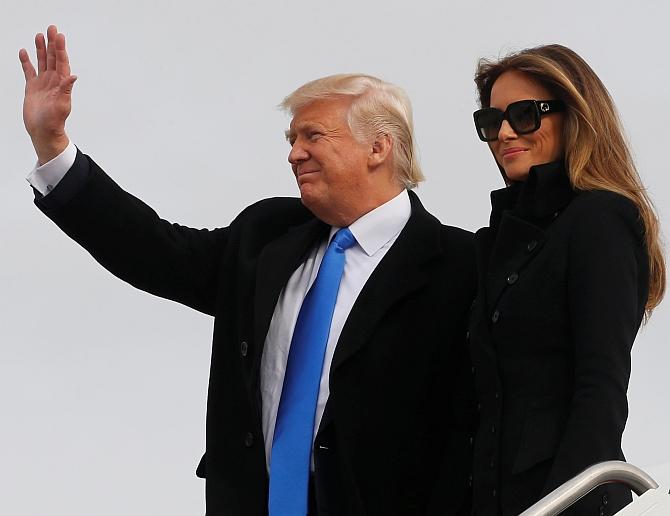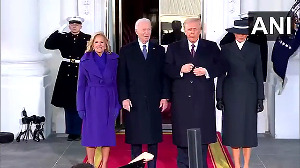'History will repeat itself after a decade or so and historians will point to the folly of May 2017 as the event that sowed the seeds of another 9/11,' warns Colonel Anil A Athale (retd).

With United States President Donald Trump's arrival in Saudi Arabia, the US expects to kick start an anti-Iran coalition.
In Saudi Arabia, Trump will meet with 56 leaders of Sunni Muslim countries who have gathered in Riyadh.
The conference marks the formation of a Sunni Muslim NATO, with a combined military force commanded by retired Pakistan army chief, General Raheel Sharif.
It is an attempt to recreate the united Islamic armies of the past and usher in a caliphate led by Saudi Arabia.
The US is expected to offer modern arms worth $100 billion to Saudi Arabia.
The target of this Sunni Muslim-US combine are Iran and Syria.
Sounds familiar? Cut to the 1980s.
The Soviet Union was the 'evil' empire and Afghanistan was the battlefield.
A movie on the events of those days, Charlie Wilson's War shows how an enterprising US Congressman made sure that the Afghan mujahideen were armed with Stringer missiles.
According to most military analysts, the supply of these missiles turned the tide against the Soviet Union in Afghanistan.
The Stingers checkmated Soviet airpower, especially its deadly helicopter gunships (the MI-24) and gave the anti-Soviet insurgents a battlefield edge.
It was a turning point in Afghanistan like the Tet offensive in Vietnam in January 1968 or the battle of Cuito Cuanavale in Angola against the South Africans.
In all these cases, more than the battlefield success, it was the psychological effect that was important.
To make Afghanistan Russia's 'Vietnam', the Americans used radicalisation to good effect.
The school curriculum to produce Islamic fighters was designed at a Wisconsin university and implemented in madarsas in Pakistan.
Another byproduct of American polices in the Afghan war was Pakistan's nuclear capability.
Less than 10 years after the Soviets were ousted from Afghanistan, the situation had changed radically.
The once glorified mujhideen metamorphosed into the murderous Taliban.
The combination of radicalisation and free supply of weapons gave birth to Al Qaeda led by Osama bin Laden, who soon turned against his former benefactors.
By 1990, the Americans were offering top dollar to mop up Stinger missiles.
President Clinton was forced to launch missile attacks against Al Qaeda and its affiliates in August 1998.
Finally, Al Qaeda struck at the US mainland on 9/11 causing over 3,000 casualties. The US then landed in Afghanistan to destroy Al Qaeda and the Taliban, essentially a Frankenstein's monster of its own creation.
The US is still bogged down in that fight in Afghanistan.
As Pakistan became an epicentre of jihad, the US urged the shutting down of madarsas and promote the de-radicalisation of education, for which it again provided generous inancial assistance to Islamabad.
After having ignored Pakistani nuclear weapons during the Afghan war, the US is now worried about these falling into the hands of terrorists.
Graham T Allison (The Atlantic, October 2004) notes that it is not whether but when a terrorist nuclear attack will take place and if that weapon will have a made in Pakistan label.
History will repeat itself after a decade or so and historians will point to the folly of May 2017 as the event that sowed the seeds of another 9/11.
Trump is not the first to flirt with the Islamic caliphate.
Our very own Mahatma Gandhi in 1919 wholeheartedly supported the pan Islamist Khilafat movement in India to foster united opposition to British rule.
Why are the Americans blind to the long term consequences?
Part of the explanation lies in the composition of the Trump administration.
Other than fashion designers or business tycoons, the only professionals in his administration are military men.
Unfortunately, the last time the US fought a conventional conflict in which strategic acumen and geopolitical vision was necessary was in 1991.
Ever since the US is mainly engaged in counter insurgency warfare, the so-called 'Company Commanders' war.
The current US military leadership thus lacks strategic vision and is innocent of history or geo-politics. There are no General Eisenhowers or General Marshals in the US military. The last of this tribe was Colin Powell.
The Indian elites are yet to realise the pincer in which they are caught.
On the one hand, the US' Middle East interests mean bolstering Saudi Arabia and associated fundamentalist Sunni nations for which Pakistan is essential.
All the arms assistance to the Middle East is eventually part of Pakistan's arsenal. India has seen this in 1965 and 1971.
On the other hand, the freeze on the Tibet issue makes for an inimical China that uses Pakistan as a proxy to check India.
Colonel Anil A Athale (retd) is a military historian.











 © 2025
© 2025